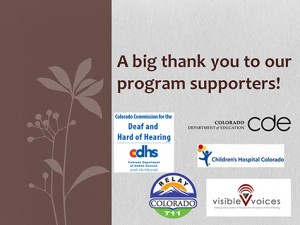“Our home district kept telling us that they could meet our child’s needs but couldn’t do a comprehensive assessment nor tell us how they could meet those needs. After 6 hours of IEP meetings, they agreed to let our child attend a center-based school out of our district. It shouldn’t be this much work.”
– Colorado Parent of an incoming three year old to preschool
What can be done when systems need improvement? Colorado H&V, Rocky Mountain Deaf School, and the Colorado Association of the Deaf received a minigrant from the Colorado Commission for the Deaf and Hard of Hearing after a competitive request for proposals. Our task? To revise, with a small group of stakeholders, the 2004 document outlining deaf education reform in Colorado called The Blueprint for Closing the Gap.
Building on the 2012-13 grant called Inspiring Change, the 2013-15 collaborative grant directed us to bring together a task force comprised of professionals who are experts in the field, concerned community members, and parents, with a 51% Deaf majority to not only revise the 2004 Blueprint for Closing the Gap in Deaf Education document, but to make recommendations for the future of deaf education in Colorado and implement one of the best practices listed in the 2004 document for today’s students.
What developed out of of almost a year’s worth of stakeholder meetings was this document:
The Seven Agreements for Closing the Gap in Colorado’s Deaf Education
Where did these ideas come from?
The Seven Agreements were developed based on the Spring 2013 Inspiring Change meetings, utilizing a meeting facilitator and a structure designed to encourage ongoing feedback as the plan was developed.
For those not familiar with the 2013 Inspiring Change events, CO H&V invited state leaders from Minnesota, Washington, and Iowa to share what their individual deaf education programs were doing to improve quality and access for students to an invited group of more than 70 professionals and parents in Colorado, who shared their feedback about what was critical to address in our current system.

Our goals were these:
- Create a meaningful learning opportunity for stakeholders to view and respond to current Colorado achievement measures for our deaf and hard of hearing students.
- Learn about what CDE can and can’t mandate and measure. Recent changes in regulations make tracking our students’ progress through available data streams a very difficult process, and not all desired data is available to make meaningful analyses of where and why students are not progressing past the dismal national average.
- Help all our participants learn about the timeline of deaf education reform activities that have taken place in the past and what supports we have available today.
- Learn from state representatives what other systems have done to improve outcomes. Some states have sought to disaggregate data through legislative means; some have taken action through a political process, some through forward thinking or interagency agreements. We invited Rick Hauan, Director of Washington’s Center for Childhood Hearing Loss, Mary Hartnett, Director of the Commission for Deaf, Deafblind, and Hard of Hearing Minnesotans, and Marsha Gunderson, Consultant from the Iowa Department of Education at the Iowa School for the Deaf.
- Get answers to these questions from those state representatives: How did change begin? What worked well in the process? How was work funded? What were the unintended consequences? What might the state have done differently today? What outcomes are expected to improve? Have they begun to improve? How are the unique needs of all deaf and hard of hearing students met within the system? We expect that our participants will have more to ask. An independent facilitator was planned for both meetings.
- Give Colorado educators, parents and representatives from the Deaf community an opportunity for a cost effective, low stress venue to build or rebuild interagency relationships and take first steps toward meaningful systemic improvement in our services to deaf and hard of hearing students, not available since 2004 with the Colorado Quality Standards work. We also invited representative from the Lt. Governor’s office and the Assistant Superintendent of Exceptional Student Services from the Colorado Department of Education to participate in our discussions.
The February 12, 2013 Meeting at Children’s Hospital Colorado:
Rhonda Tyree, our independent facilitator, joined Janet DesGeorges, Hands & Voices Executive Director, in welcoming the participants. Janet opened with these remarks on collaboration included in the master PowerPoint for the day’s session. Cliff Moers followed with a Call to Action.
See both presentations included in the master PowerPoint.
Master Inspiring Change PowerPoint, including Call to Action (Powerpoint)
Cheryl Johnson, The ADEvantage Consulting, and past CDE Consultant (1990-2006) shared a timeline of past efforts at improving Colorado outcomes and systems, and a variety of structures for Deaf education in the various states.
Background: Colorado History and Relfections on Deaf Education: Johnson link
Mary Hartnett shared Washington’s comprehensive, legislated plan to disaggregate data for better review of educational outcomes, regular reporting, and funding for implementation of their plan, along with insights about how Minnesotans joined together to advocate for services and regulations that support equal access for all Deaf/hh citizens. She stressed that their key pieces of legislation required significant support from a variety of organizations and included consumers, parents, and health/education/service and advocacy organizations. Much of the information shared (and more) can be found on the Minnesota Commission website.
Minnesota Presentation Hartnett Feb2013
Rick Hauan spoke about the development of Washington’s expanded “inreach” program, going from a very small centralized staff to 29 professionals representing a variety of disciplines and expertise in various communication modes and skills, located throughout the state. Their mandate from the legislature is to support families, districts and students, and listed staff members include audiologists, school psychologists, SLP’s, an interpreter coordinator, teachers of the deaf/hard of hearing, and a bilingual coordinator. Also underway is an expanded effort in the 18-21 year old Transition program for students engaged in career and college readiness. Hauan shared how this plan emerged following concerns about the Washington State School for the Deaf and direction from the legislature to improve supervision of students and training for staff in the residential life program. Hauan did not share a PowerPoint but did provide the legislation and brochure link which further explains the program in writing.
Ruth Mathers, Consultant from the Colorado Department of Education, shared the most recent student achievement data.
Participant evaluation data from the Feb 12th meeting.
Anyone invited but not able to attend the Feb 12th meeting should carefully review the documents from that meeting.
Second meeting: April 24, 2013 meeting was held at the Denver Central Library, 13th a from 9-4 on Wednesday, April 24th.
Marsha Gunderson, Iowa Department of Education Consultant housed at the Iowa School for the Deaf, presented on the Iowa model, including achievement data, regional programs, and the expanded core curriculum. The remainder of the day focused on facilitated discussion building on the February 12th information.
The group of stakeholders came up with a prioritized list of 56 proposed strategic initiatives for improving student outcomes in our state. You can see the 56 initiatives in the Inspiring Change_Final Report.
The Seven Agreements report calls for change. We’d like to see voluntary agreements to implement a statewide strategic plan through a stakeholder committee that will address the issues outlined in the Agreements, so this preschooler mentioned above has access to a quality program and a bright future. We hope that strategic planning group comes about through voluntary agreements. If legislation is needed, we hope you will join the individuals and groups who have already pledged to support that effort.
Thank you for answering the call to change!
Sara Kennedy
Articles and resources of interest:
http://www.mncdhh.org/education/321/deaf-education-summit
Colorado_April_24_2013_Iowa’s_Story
This page was developed with support from a grant from the Colorado Commission for the Deaf/Hard of Hearing (CCDHH).

Recent Comments